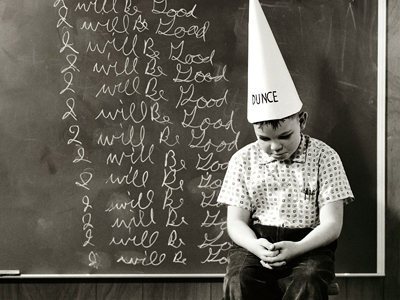 Last week, I shot a commercial in New Brunswick. The cast included a 7-year-old and if you know anything about New Brunswick, you know it's 4,000 miles from Hollywood. Which means you're not likely to find a lot of professional 7-year-old actors there.
Last week, I shot a commercial in New Brunswick. The cast included a 7-year-old and if you know anything about New Brunswick, you know it's 4,000 miles from Hollywood. Which means you're not likely to find a lot of professional 7-year-old actors there.
That's okay, actually, because at seven what you want from an actor is enthusiasm more than experience. The kid we cast was actually great. Totally adorable, totally enthusiastic. But even the most enthusiastic, adorable kid can only perform so much. And thanks to common sense and child labor laws, we were limited in the amount of time we could spend with him.
So when we had two more critical shots with the kid and I could tell he wasn't quite getting the meaning of the line he had to say, I did something I normally never do. I gave him a line reading.
In case you're not familiar with the term, a line reading is when you say a line the way you want your actor to say it. And it's usually a bad thing to do because a) unless you're an actor yourself, you don't really know what you sound like when you say something, b) even if you're an actor yourself, how somebody else says something is going to be different from the way you say it, and c) even if you're an actor yourself and you can get somebody else to say something the way you would, it demeans their talent. It's like you're saying they don't know how to communicate when that's fundamentally what actors do.
But like I say, I had limited time and an inexperienced actor. And very little hope that taking him aside –– one more time –– and explaining what the line meant was going to improve his understanding of it.
I like to think I handled it fairly well. For one thing, I didn't go to the line reading until I was sure we weren't going to get what we needed any other way. And for another, I enlisted the help of another actor to deliver the line reading.
I know what you're thinking. You're thinking, "Brian, if you can't know how you sound to an actor, why would you make things worse by playing telephone with the information?" Well, I'll tell you.
Because I wanted there to be a bit of a cognitive gap. If the kid were to parrot me, I'd be evaluating his readings based on my delivery. But if I ask someone else to deliver the lines, I have no preconception about how the line sounds before it comes out. So I can disregard the older actor's delivery and concentrate on the kid's as if it's fresh.
As it turns out, I happened to have a really talented, generous, helpful actor on set, who was not only willing to give the kid line readings, but did so with enthusiasm and variety.
We got the line we needed, delivered a bunch of different ways. And we had time to set up, light, and shoot the other shot we needed of the kid. Best of all, nobody's feelings got hurt.
Okay, best of all, we got a really lovely performance.
 If you're not familiar with pdnonline.com, now would be a great time to check it out.
If you're not familiar with pdnonline.com, now would be a great time to check it out.





